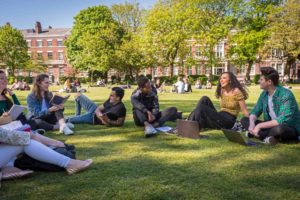Law with Politics
UCAS code T945
- Study mode
- Full-time
- Duration
- 3 years
- Start date and application deadlines
-
- Start date
UCAS code T945
Our Law with Politics programme allows students to combine law with a complimentary programme and still pass through the academic stage of the route to practice. Studying these subjects together means tackling some of the most interesting and important social issues of our times.
This degree draws upon the existing strength of both the Liverpool Law School and the Department of Politics in a programme which takes you through the academic stage of the route to practice.
You will study the core modules required to obtain a law degree for professional purposes while being able to undertake advanced study of politics, asking questions about power, justice, conflict, sovereignty and decision making on a local and international scale. Module options available in law enable you to specialise in relevant fields of legal study; for example, the law of contract, public law, law of tort, equity and trusts, and land law.
Liverpool Law School offers a wide range of optional modules that allow students to specialise in one aspect of law, if they choose, or to mix options from across the curriculum. Our module leaders are leading researchers in their chosen field, offering students the opportunity to learn about the law from expert scholars and practitioners.

We’re proud to announce we’ve been awarded a Gold rating for educational excellence.
Discover what you'll learn, what you'll study, and how you'll be taught and assessed.
Mandatory modules in year one are designed to provide students with a comprehensive overview of key concepts, debates, and skills in both law and politics.
In addition to studying some of the modules that must be passed to gain a qualifying law degree, known as the ‘Foundations of Legal Knowledge’, students also undertake politics modules with a value of 30 credits in the first year.
| Compulsory modules | Credits |
|---|---|
| FOUNDATIONS OF LAW AND SOCIAL JUSTICE (LAW102) | 30 |
| LAW OF CONTRACT (LAW105) | 30 |
| PUBLIC LAW (LAW106) | 30 |
| FOUNDATIONS IN POLITICS (POLI109) | 15 |
| FOUNDATIONS IN INTERNATIONAL RELATIONS (POLI104) | 15 |
Programme details and modules listed are illustrative only and subject to change.
Year two is made up of compulsory modules that must be passed in order to gain a qualifying law degree, known as the ‘Foundations of Legal Knowledge’, along with politics modules with a value of 30 credits.
| Compulsory modules | Credits |
|---|---|
| LAW OF TORT (LAW209) | 30 |
| EQUITY & TRUSTS (LAW211) | 30 |
| LAND LAW (LAW242) | 15 |
| LAW AND SOCIAL JUSTICE IN ACTION (LAW212) | 15 |
Programme details and modules listed are illustrative only and subject to change.
In addition to core modules, students choose two optional law modules in each semester. Students must choose 60 credits from the optional law modules and 30 credits from the optional politics modules.
All year three optional modules are 15 credits each, except dissertation (semester one and two) which is 30 credits. Most year three optional modules are taught through blended learning methods, including weekly lectures (two hours per week), seminars (either 60 minutes each bi-weekly or 90 minutes three times during a semester), optional drop-in sessions during office hours, independent legal research, e-learning strategies, and formative assessments.
Most year three optional modules are assessed on a summative basis through examination, coursework or a combination of both. Some optional modules, however, are partially assessed by the following methods: group project (LAW 377: Debates in Charity Law); practical assessment or presentation (LAW369: Access to Justice and Welfare Rights Advice Placements, LAW373: Corporate Insolvency Law; LAW 354: International Law in Current Affairs) and casework and/or reflective logs (LAW321 (Clinical Legal Skills), LAW369: Access to Justice and Welfare Rights Advice Placements).
| Compulsory modules | Credits |
|---|---|
| LAW OF THE EUROPEAN UNION (LAW310) | 30 |
| CRIMINAL LAW (LEVEL 6) (LAW307) | 30 |
Programme details and modules listed are illustrative only and subject to change.
You will be taught through a combination of large group lectures and small class sessions, such as tutorials, seminars or workshops. Formal lectures are intended to give you a sound understanding of relevant legal topics, and you are expected to enhance your knowledge through private study and research. Tutorials and seminars require active student participation and are particularly effective in assisting you in applying the law to practical situations. In addition, we use alternative forms of teaching delivery to provide a broad-based learning experience for our students. For example, student learning is enhanced through the use of podcasts and lecture capture technology, drop-in sessions, learning cafés, and clinical legal skills workshops. Online resources and exercises, group work, and presentations all help to ensure that you develop a strong set of transferrable skills.
Assessment takes many forms, each appropriate to the learning outcomes of the module in question. Degrees are classified on the basis of 240 credits, taken across the final two years in each programme. Year two contributes 30% to the overall classification and the final year contributes 70% to the overall classification. For students taking a year abroad or in China, the programme lasts four years and year three is spent in your chosen destination.
Formal assessment tends to take place twice in an academic year; once at the end of semester one (January) and then again at the end of semester two (May-June). Some modules may employ formal mid-semester assessment opportunities too. We use a range of methods to ensure that assessments complement learning, including seen and unseen examinations and extended coursework assignments. Other methods, such as case work, empirical projects, and the preparation of reflective journals, are also used to ensure that you experience a diverse range of assessment as part of your programme.
We have a distinctive approach to education, the Liverpool Curriculum Framework, which focuses on research-connected teaching, active learning, and authentic assessment to ensure our students graduate as digitally fluent and confident global citizens.
The Liverpool Curriculum framework sets out our distinctive approach to education. Our teaching staff support our students to develop academic knowledge, skills, and understanding alongside our graduate attributes:
Our curriculum is characterised by the three Liverpool Hallmarks:
All this is underpinned by our core value of inclusivity and commitment to providing a curriculum that is accessible to all students.
The qualifications and exam results you'll need to apply for this course.
| Qualification | Details |
|---|---|
| A levels |
ABB |
| GCSE |
GCSE English and Maths grade C/4 |
| BTEC Level 3 national extended diploma |
D*DD. Acceptable BTEC are:: Applied Human Biology, Applied law, Applied Psychology, Applied Science, Business, Business Accounting and Finance, Computing, Enterprise and Entrepreneurship, Forensic and Criminal Investigation, Health and Social Care, ICT, Information Technology, Public Services, Sport, Sport and Exercise Science, Strategic Management and Leadership, Travel and Tourism, Uniformed Protective Services. |
| BTEC combinations |
BTEC National Diploma DD plus A at A level; BTEC National Extended Certificate D plus AB at A level. |
| Welsh Baccalaureate Advanced |
B in the Welsh Baccalaureate, plus AB at A level |
| Access |
Pass relevant Access to HE Diploma with 45 Level 3 credits with 33 at Distinction and 12 at Merit |
Studying with us means you can tailor your degree to suit you. Here's what is available on this course.
University of Liverpool students can choose from an exciting range of study placements at partner universities worldwide.
Immerse yourself in Chinese culture on an optional additional year at Xi'an Jiaotong Liverpool University in stunning Suzhou.
Every student at The University of Liverpool can study a language as part of, or alongside their degree. You can choose:
Your course will be delivered by Liverpool Law School and the Department of Politics in the School of Law and Social Justice Building. Students have access to state-of-the-art facilities and are a short walk from the Sydney Jones Library. Based in the Knowledge Quarter, a 10 minute walk from the city centre, students are surrounded by history and culture.






From arrival to alumni, we’re with you all the way:

Want to find out more about student life?
Chat with our student ambassadors and ask any questions you have.
Our programmes are empowering, engaging and make you employable. Our Employability team offer specialist advice and support with work placements, professional mentoring, employability-focused activities and the HEAR award. Students can also gain invaluable experience at Liverpool Law Clinic, assisting in-house, qualified lawyers provide free and confidential legal advice to members of the public. You will develop a range of social scientific, analytic and communication skills and a variety of transferable skills valued by many employers in a range of industries (e.g. legal sector, media organisations, local government and charitable organisations, the criminal justice system and commercial and financial service sectors).
The majority of our graduates enter the legal profession. However, any degree which incorporates law is recognised as a mark of academic excellence in virtually all employment spheres. Past graduates have embarked on a wide variety of professions; for example, in the civil service, banking, construction, charities and international non-governmental organisations, business management, academia, the armed forces, accounting and finance, and the police and emergency services.
We organise regular careers events and routinely play host to law firms who wish to come and meet our students. There is an annual law fair, giving students the opportunity to meet future legal employers. Academic staff in the Law School and Careers & Employability also offer invaluable careers advice and support. Every year, our students become members of the Inns of Court, secure scholarships for vocational training, and obtain vacation placements, training contracts, and mini-pupillage opportunities from a range of providers.
Undergraduate students can develop their legal skills through a number of extracurricular activities, such as mentoring by members of the legal profession, mooting, and negotiation competitions. There are four student legal societies which cater for the diverse career trajectories of our students and host lively extracurricular and enrichment activities.
We also help our students to take advantage of work experience placements with organisations like the Citizens’ Advice Bureau, Asylum Link, Merseyside Welfare Rights, and other pro-bono service providers.
We broker a range of placement opportunities, typically offering students the chance to spend two or three weeks during the vacation period working within an international law firm or alongside in-house lawyers in major commercial companies. We also offer a number of year-long placements in China to students on a competitive basis.
The Law Clinic gives many students their first taste of professional practice: students work under the supervision of a lawyer, meeting clients, researching legal problems, and drafting advice. Confidentiality, clear communication, and client satisfaction are all emphasised as essential elements of the Clinic’s service. This helps students experience the practical aspect of law whilst contributing towards their degree through the completion of practically-assessed modules.
Typical courses studied by graduates from this programme:
92% of law students are in work and/or further study within 15 months of graduation.
(Discover Uni, 2018-19.)
Your tuition fees, funding your studies, and other costs to consider.
Full-time place, per year - £9,535
Full-time place, per year - £24,100
The tuition fees shown are correct for 2025/26 entry. Please note that the year abroad fee also applies to the year in China.
Tuition fees cover the cost of your teaching and assessment, operating facilities such as libraries, IT equipment, and access to academic and personal support. Learn more about paying for your studies.
We understand that budgeting for your time at university is important, and we want to make sure you understand any course-related costs that are not covered by your tuition fee. This could include buying a laptop, books, or stationery.
Find out more about the additional study costs that may apply to this course.
We offer a range of scholarships and bursaries that could help pay your tuition and living expenses.
If you’re a UK student joining an undergraduate degree and have a household income below £35,000, you could be eligible for a Liverpool Bursary worth up to £2,000 for each year of undergraduate study.
Apply for an Asylum Seekers Scholarship and you could have your tuition fees paid in full and receive help with study costs. You’ll need to have applied for asylum in the UK, or be the dependant of an asylum seeker, and be joining an eligible undergraduate degree.
If you’ve spent 13 or more weeks in Local Authority care since age 14, you could be eligible for a bursary of £3,000 per year of study. You’ll need to be a UK student joining an eligible undergraduate degree and be aged 28 or above on 1 September in the year you start.
Are you a UK student with a Black African or Caribbean heritage and a household income of £25,000 or less? You could be eligible to apply for a Cowrie Foundation Scholarship worth up to £8,000 for each year of undergraduate study.
If you’re a UK student identified as estranged by Student Finance England (or the equivalent UK funding body), you could be eligible for a bursary of £1,000 for each year of undergraduate study.
Joining a School of Biosciences degree and have a household income of less than £25,000? If you’re a UK student, you could apply to receive £4,500 per year for three years of your undergraduate course.
Do you live in the Liverpool City Region with a household income of £25,000 or less? Did neither of your parents attend University? You could be eligible to apply for a Nolan Scholarship worth £5,000 per year for three years of undergraduate study.
Are you a UK student with a household income of £25,000 or less? If you’ve participated in an eligible outreach programme, you could be eligible to apply for a Rigby Enterprise Award worth £5,000 per year for three years of your undergraduate degree.
Are you a UK student with a household income of £25,000 or less? Did neither of your parents attend University? You could be eligible to apply for a ROLABOTIC Scholarship worth £4,500 for each year of your undergraduate degree.
Apply to receive tailored training support to enhance your sporting performance. Our athlete support package includes a range of benefits, from bespoke strength and conditioning training to physiotherapy sessions and one-to-one nutritional advice.
Joining a degree in the School of Electrical Engineering, Electronics and Computer Science? If you’re a UK student with household income below £25,000, you could be eligible to apply for £5,000 a year for three years of study. Two awards will be available per academic year.
If you’re a young adult and a registered carer in the UK, you might be eligible for a £1,000 bursary for each year of study. You’ll need to be aged 18-25 on 1 September in the year you start your undergraduate degree.
Use our handy chatbot for your Clearing enquiries.
Last updated 17 June 2025 / / Programme terms and conditions